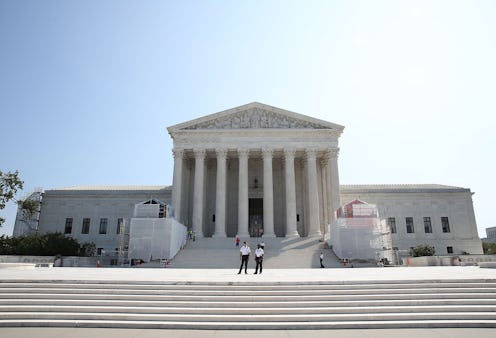News
Could SCOTUS Decide The Next POTUS?
It's well-established that the next president will determine the next Supreme Court justice, but what role, if any, does the United State's highest court play in determining the next president? Could the Supreme Court decide the 2016 election?
Allegations of sexual misconduct and a tape of him making degrading and predatory comments about women have caused Republican nominee Donald Trump to slip in the polls less than a month before Election Day. And if his recent move to question the legitimacy of the U.S. election is any indication, Trump is clearly struggling to accept the possibility he may not be the winner he believes himself to be. Trump spent much of the past week urging supporters in heavily white areas to "watch other communities because we don't want this election stolen from us." While Trump's warnings of a stolen election have sparked fears of voter fraud in his supporters, it's raised concerns among others that, in one way or another, we're headed for a contested election.
While it could be paranoia stirred up by one candidate's unwillingness to concede defeat that causes a disputed election, it is also possible that no candidate will secure a majority of electoral votes or that the results will close enough to require multiple recounts. But could things become so disputed that the 2016 election lands before the Supreme Court? It's happened before.
While the Supreme Court could theoretically determine the outcome of an election, the court isn't a common part of the election process. Traditionally both the president and the vice president are elected via an indirect election, meaning voters cast ballots to elect electors pledged to their preferred presidential candidate. These electors make up the Electoral College and in most states, the candidate who receives the most popular votes receives all of that state's electors.
The number of electors a state could have varies based on its Congressional delegation, but the total number of electors in the Electoral College is 538. A candidate must have 270 votes to secure the majority of electoral votes needed to be elected president. If no majority is obtained, the House of Representatives elects the president from the top three vote-scoring candidates on the ballot. This has only happened twice — in 1800 and 1824.
So how might the 2016 election land before the Supreme Court? Should this year's presidential election result in incredibly close margins of loss that spur vote recounts, the Supreme Court could be given the choice to weigh in on the election, potentially determining its outcome as it did in 2000. A dispute taken to a lower court always has the potential to end up in the Supreme Court, which is what happened in the case of Bush v. Gore in 2000. The Supreme Court's 5-4 ruling to end the recounting of ballots in Florida combined with Al Gore's decision to accept the ruling and concede made George W. Bush president.
While it's much too soon to hypothesize about the likelihood that this election will result in disputed vote recounts and land before the Supreme Court, as the 2000 election did, we've certainly seen enough unpredictable things happen over the course of this election to not rule anything out.
